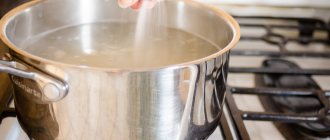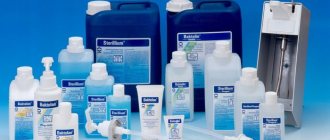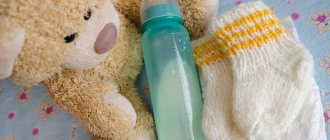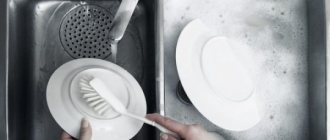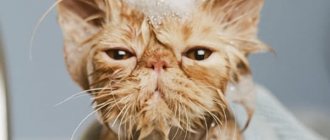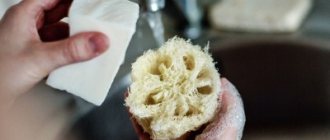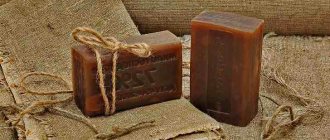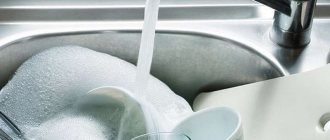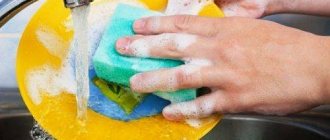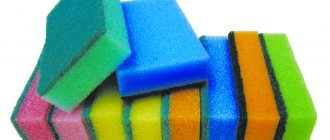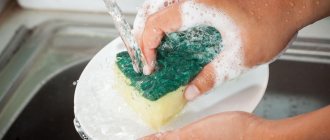Want to save money on your home budget? Use household cleaners instead of household chemicals. Use lemons to remove limescale, bleach dishes with baking soda and hydrogen peroxide. Mustard and laundry soap fight grease. Cooking old frying pans in a solution with glue, even homemade dishwasher tablets, is no longer a problem.
Purchased household chemicals quickly and effectively remove any contamination. But often the composition of such products leaves much to be desired. It is not always possible to completely remove the remains of detergents, gels and cleaning powders from plates and cups. Allergy sufferers and children are especially affected. Manufacturers offer a number of environmentally friendly dishwashing detergents, but they are more expensive than their “aggressive” counterparts. That is why many people switch to homemade recipes, prepared with their own hands, the naturalness and harmlessness of which is beyond doubt.
Lemon
You can make your own dishwashing liquid using very simple ingredients. There is no need to look for special ingredients and spend large sums - everyday products will do the job perfectly. Recipes for household detergents are simple; the method of preparing them does not require much time or special knowledge and skills. The resulting mixtures should be stored in glass containers at room temperature.
Lemon destroys all unpleasant odors
So, the first option is lemon juice, which is used not only to remove stains from clothes, but also to treat cutting boards after cooking fish. It removes the smell of onions and garlic very well. Cut the lemon in half and wipe the board clean. Use the juice when washing your hands and add it to any detergent as it is the best natural fragrance.
Tip: Tired of fighting lime in your kettle? Just pour water over the lemon slices, bring to a boil, leave for half an hour and get back to cleaning!
The best proven recipes
Liquid formulations or dishwashing gel can be prepared according to various recipes.
Liquid formulations or dishwashing gel can be prepared according to various recipes
Experienced housewives highlight the best of them, meeting all needs, economical and non-allergenic:
- Universal detergent.
- A paste (can also be prepared as a liquid) for cleaning the surface of pans.
They are used to remove dirt not only from dishes, but also from various surfaces (stove, oven, baking sheets).
In 90% of cases, recipes contain:
- soda;
- laundry, baby or bath soap bars;
- lemon (citrus) juice (squeeze from lemon before use);
- dry mustard in bags (powder);
- hydrogen peroxide;
- glycerin (ready-to-use pharmaceutical composition);
- vinegar (table vinegar - classic, apple or wine vinegar is used if there is no table vinegar).
It is recommended to store the resulting cleaning products in glass containers to prevent oxidation, at room temperature.
Read more ► The best carpet cleaner, how to use Vanish, instructions for beginners
Lemon, citrus fruits, herbal infusions, essential oil are added to add aroma.
Universal gel paste
Lemon, citrus fruits, herbal infusions, essential oil are added to add aroma.
To create a composition that can work with different surfaces and dirt, the following ingredients are needed:
- hot water - 4 cups (it can be heated in a kettle or boiled in a saucepan);
- baking soda – 30 g or 8 tsp;
- dry mustard – 30 g;
- laundry soap (you can use classic bar soap or baby soap) – 45 g;
- ammonia - 4 tbsp. l. (must be purchased at a pharmacy).
Cooking tools:
- fine-toothed grater;
- pan with enamel surface;
- glass jar (1-1.5 l) or similar container that can be tightly closed as needed;
- cover (polyethylene).
Scheme for creating a gel-like paste for dishes:
- Grind the laundry soap (the output should be small shavings). Moistening the piece with water will help make the work easier.
- Pour water into the pan, heat it, do not boil.
- Place the soap shavings and stir until the component is completely dissolved in the water.
- Add soda and mustard to the resulting suspension, stir the mixture until a homogeneous substance is obtained.
At the final stage, ammonia is introduced into the product. Stirring continues for 3-5 minutes.
For subsequent storage, the composition is poured into a glass jar and closed with a polyethylene lid (iron ones are not used to avoid oxidation).
Before the first use, the gel paste is infused at a temperature of +22…+23 degrees for 2 hours. Using the product, cutlery and dishes, tiles in the kitchen and bathroom, stove and sink are washed.
Before the first use, the gel paste is infused at a temperature of +22…+23 degrees for 2 hours
Using a respirator while preparing the mixture or cleaning will help protect the mucous membranes of the eyes and nose. At the end, the room is ventilated from the smell of ammonia for 5-10 minutes.
Tip: heavy dirt, dried or burnt grease on the surface is removed by applying a universal composition, which remains on the surface for 15 minutes. It is washed off with a damp cloth or running water.
"Fizzy" against fat
This product is easy to prepare and has a natural composition. It removes various contaminants - fats, oils, food residues, natural dyes. Suitable for dishes made of different materials.
Components included:
- standard soda, suitable for consumption (effervescent ingredient) – 20 g;
- hydrogen peroxide – 23 ml;
- water (boiled) – 170 ml.
Cooking steps and sequence:
- In boiling water, just removed from heating, soda dissolves (quick stirring).
- After these manipulations, hydrogen peroxide is introduced into the liquid (repeated mixing).
The “pop” should be stored in a glass container - the container should be closed with a lid. If there is no hydrogen peroxide, then it is replaced with table vinegar (essence diluted to the required concentration).
Rules for using the effervescent composition:
- Apply to greasy or dirty surfaces (dishes, plates, table surfaces, cutlery, stove).
- Leave for 7-10 minutes until all components begin to work actively.
- Wipe (use a soft sponge).
- Rinse off the product with warm water.
Read more ► “Whiteness” for whitening clothes in a washing machine and 7 more options for use
Homemade Lemon Remedies
Compositions with lemon remove contaminants: fatty, oily, resulting from protein or plant foods.
Compositions with lemon remove contaminants (fatty, oil, resulting from protein or plant foods), have a pleasant and unobtrusive aroma, do not irritate the skin of the hands, and do not age it.
With their help, dirt on walls and tiles is removed.
Products with lemon juice remove scale from the inner walls of the kettle (used for conventional and electric ones).
To do this, pour 30-50 ml of juice, heat it and leave for 180 minutes. After draining the liquid, rinse the kettle with running water.
Lemon gel for cutlery, containers and dishes effectively removes grease stains.
Juice eliminates unpleasant odors:
- fresh or smoked fish;
- Luke;
- garlic
The product is washed off the first time, your health does not deteriorate, since all the components are natural.
Lemon gel
Ingredients:
- fresh lemon juice – 30 ml (there should be no seeds or pulp in it, so you need to pass it through a filter or cheesecloth);
- laundry soap (shavings) – 45 g;
- glycerin – 25 g;
- vodka (or alcohol diluted to concentration) – 5 ml.
Preparation:
- Dissolve fine soap shavings completely in water (foam appears, sediment is eliminated).
- Pour in lemon juice, glycerin and vodka (keep stirring).
- Pour into a convenient and practical unbreakable glass container.
Cleanser for mirrors, glass and mirror surfaces and dishes
DIY mirror cleaner
Ingredients:
- running water - a glass;
- vinegar – 100-120 ml (option – essence diluted several times with water);
- lemon juice – 10 ml.
Preparation:
- Leave the water in the room for 2-3 hours (so that it warms up to room temperature).
- Pour vinegar and juice into it.
- Shake.
- Pour into a container with a sprayer and use during cleaning.
Cleansing liquid and mustard paste
Mustard will help get rid of dirt. Dishwashing liquid can be easily prepared using powdered mustard.
The composition may have the consistency of paste or 10% sour cream. Stains and grease residues, dietary fiber are removed, and dried food residues are softened.
Cleaning Liquid Recipe
Are used:
- table powdered mustard – 20 g;
- water – 1000 ml.
Creation of the tool:
- Heat the water to +90 degrees (do not let it boil).
- Remove from heat and add mustard.
- Stir so that there is no sediment.
Readiness is determined by abundant foam. Suitable for removing grease and burnt residue from glass or enamel surfaces. Wash off with warm water (average pressure).
Mustard paste
Mustard paste for washing dishes
Ingredients:
- boiling water - 200 ml (use the one that has just been removed from heating);
- soda – 10 g (abrasive component, excluded from the composition when cleaning non-stick coatings);
- powdered mustard – 20 g.
Read more ► Liquid for removing old wallpaper: make it yourself or choose from ready-made ones
All components are combined and mixed with quick rotational movements.
How to use the paste:
- Rub the surface with the paste prepared according to the recipe.
- Leave for 20 minutes.
- Wipe with a dry cloth or soft sponge.
- Rinse with running warm water.
Soap and glycerin gel
Household kitchen utensils, spoons and forks are cleaned with dish gel containing soap and glycerin.
Used:
- soap (baby, laundry or bath) without fragrances, dyes, aromatic additives – 40 g;
- running water – 200 ml;
- vodka (honey alcohol) – 20 ml;
- glycerin – 80 ml.
Heat water, add all ingredients, mix. Readiness is determined by the disappearance of soap components.
Baking soda and hydrogen peroxide
To enhance the cleansing effect, table salt is used.
Homemade detergent for washing dishes and surfaces on which food is prepared is made on the basis of dry soda mixed with hydrogen peroxide.
An exception is a number of special surfaces that require gentle handling.
For preparation use:
- soda – 2 tbsp. l. (can be replaced with salt);
- hydrogen peroxide – 20 ml;
- water – 150 ml.
To enhance the cleansing effect, table salt (coarse or rock) is used. The ingredients must be mixed until completely dissolved; the water must be heated to +60 degrees before use.
Baby soap and soda
Children's dishes can be cleaned with a product made from fragrance-free soap and soda.
Ingredients:
- soap - 40 g (it should be without dyes, strong odor, glycerin options are not used);
- water (warm or cooled after boiling) – 200 ml;
- baking soda – 20 g.
Preparation:
- The soap is crushed with a knife or using a grater.
- Soap is placed in water and completely dissolves (you need to make sure that no sediment remains).
- Add baking soda and mix the entire mixture again.
The composition is washed off from the surface with running warm water 1-2 times.
Laundry soap
The name speaks for itself: a truly versatile home assistant has not escaped kitchen troubles. Make laundry soap as follows:
- Rub off a quarter of the dark soap.
- Pour the resulting chips into a bowl and place in a water bath.
- Slowly pour half a cup of water into the soap shavings until it melts.
- Add 5 tablespoons of glycerin to soften your hands.
At first the product will be liquid, but then it will thicken, turning into a dish gel. For a pleasant aroma, you can add 4-5 drops of any essential oil. For disinfection purposes, add 1 tablespoon of drinking alcohol to the mixture.
Important: put the soap in cold water and slowly dissolve over low heat (or in a water bath). If you dip the chips in hot liquid, they will dissolve less easily. Stir the mixture.
Soda
Baking soda works well for washing dishes. Even if he swallows it, there will be no problem. It is enough to dissolve 1 tablespoon of powder in lukewarm water (1 liter).
A solution of natural baking soda can whiten fittings, tiles and even linens.
Baking soda restores yellow glassiness, removes soot from pots and pans, cleans stoves and ovens, and gets rid of soot and tea deposits. To enhance the effect, it is supplemented with other components.
Main components
How can you replace the product from the store:
- Soda.
- Mustard.
- Vinegar.
- Lemon.
- Laundry soap.
- Wood ash.
Soda
Soda was used before, when there were no ready-made gels and powders. It gets rid of greasy deposits and coffee stains, helps clean forks and spoons from darkening, and helps rid knives and cutting boards of the smell of fish or meat.
Its advantages are as follows: it copes well with burnt food residues, perfectly cleans glass surfaces, and eliminates unpleasant odors.
Baking soda also has disadvantages - it dries out the skin of the hands, so use can only be done with gloves. Also, in rare cases, an allergic reaction to soda is possible.
Mustard
Mustard powder is often used to make detergents; it was used back in Soviet times in all public catering establishments and in home kitchens. Mustard kills bacteria and removes burnt fat. In addition, it is a natural product that copes well with fat.
However, mustard is weakly effective in cold water, it dries the skin, and it is dangerous to use it without gloves, as the product can burn the skin of your hands.
Vinegar
Vinegar can be found in almost every home, but few realize that it is good for washing dishes. Despite its pungent odor, it is used as a component in household detergents. For preparation, different types of vinegar are used - simple table, apple, wine.
Vinegar perfectly kills all bacteria - by spreading undiluted vinegar over a cutting board and leaving it for a day, you can clean and disinfect the surface. It is also suitable for heavy soiling. But the product has a pungent odor; it can only be used with gloves.
Lemon
Lemon is a natural bleach and stain remover. It has a pleasant smell and is absolutely safe for people (unless you are allergic to citrus fruits). For homemade gels and powders, only the zest is often used to create a pleasant aroma.
Lemon product perfectly removes unpleasant odors (fish, onions), and it is also easily washed off with water from dishes. However, the product with lemon is not suitable for people with allergies and is quickly consumed.
Laundry soap
Laundry soap does not contain dyes, preservatives, or fragrances - it is completely hypoallergenic. It contains vegetable oil, fats, and sodium salts. But this only applies to brown bars of soap. Laundry soap is hypoallergenic and has a bactericidal effect. However, it is ineffective in hard water and not everyone likes its smell.
Wood ash
You can extract lye from it, which does an excellent job of removing dirt. Actively used in hiking conditions. This product washes off well with water and has virtually no odor.
The disadvantages include the fact that wood ash only works on particularly greasy stains (unrefined soap is formed only when interacting with fat) and must be prepared in advance.
Soap and soda solution
It’s nice to “work” in tandem with soap and baking soda (both laundry soap and grated baby soap). Pour half a glass of grated bars into a bowl of hot water (1 glass of boiling water is enough). Beat with a whipping mixer. Let the mixture cool, then add ¼ package of baking soda and stir. If necessary, add 5-10 drops of any essential oil (citrus and mint are suitable).
Combine all ingredients and mix again until an airy soufflé is formed. Soap mixture Pour the laundry and baking soda into a container with a lid. After cooling it thickens. It is convenient to dose the composition with a teaspoon.
Ancient methods of cleaning - into modern times
In the old days, fat was removed from the surface of the dishes with lye - a saturated solution of ash . Washcloths were made from fresh nettle stems or hemp leaves.
Europeans used seaweed . Burnt food was removed with brick crumbs or sand.
Hot potato broth is also suitable for cleaning dishes . Silver cutlery was cleaned with chalk, then it sparkled perfectly.
, mustard powder has come into modern kitchens . Only it is effective only with hot water. It can dry out your hands, so housewives have slightly improved recipes using mustard powder.
Soda-hydrogen "fizzy"
Dish detergent can be replaced with hydrogen peroxide and baking soda. The composition is suitable for all types of dishes, as well as for stoves and ovens. We offer 2 cooking methods:
- Add 1 tablespoon of baking soda to 200 ml of hot water and sodium bicarbonate, pour into a bottle, shake.
- Spray onto dirty dishes and work surfaces, leaving the composition for 8-10 minutes, and then rinse as usual;
- if you add 1/4 peroxide to 1/2 tablespoon baking soda, you will get a thick substance. Convenient to clean the refrigerator, oven, enamel pans.
For convenience, pour the product into a spray bottle.
Homemade cleanser, excellent whitening agent. Peroxide can be replaced with vinegar mixed in equal proportions with the main ingredient. Wear rubber gloves while working.
What are soap nuts and how to use them
Based on the name, you can understand that these nuts are soapy and can be used as a product for personal hygiene, laundry, and dishwashing. It was used by Hindus and other peoples already 1000 years ago, since the tree on which such nuts appear grows mainly in India. Their soaping ability comes from saponin. This is a substance that, when interacting with water, forms soap foam. It also eats away fat well.
Modern methods of storage and transportation make it possible to use such a generous gift of nature anywhere on the planet. Soap nuts are dried, sorted into packages and sent to other countries. In this form they are stored for up to 24 months.
Pros of Soap Nuts:
- Hypoallergenic.
- Doesn't dry out the skin.
- They treat skin diseases (dermatitis, allergies).
- They do not contain alkali.
- Antifungal effect.
- Bactericidal action.
They also have disadvantages:
- Difficult to find in some cities, must be ordered from online stores.
- Less effect when used in cool water.
- Causes irritation upon contact with the cornea. Contact with eyes should be avoided.
3 ways to use soap nuts:
- Take the berries (nuts) whole and foam them with water.
- Grind the shell.
- Prepare a decoction.
The last method for washing dishes is preparing a decoction. It is spent more economically than all the listed methods. The result is a gel-like mass, which is convenient to use by pouring it into a container with a dispenser. This gel can be stored for no more than 3 weeks.
What you will need for preparation:
- 10-15 pieces of nuts.
- Hot water – 1 l.
Homemade Soap Nut Dishwashing Soap:
- Crush the nuts (sometimes suppliers immediately sell them in this form). A coffee grinder will do this well.
- The water needs to be heated.
- Pour it over the fruits.
- Put on fire and boil for half an hour.
- Cool the broth.
- Separate the shell from the gel.
How to use in dishwasher:
- Place the crushed fruits in a cloth bag and tie it. Throw it in the dishwasher.
- Prepare a decoction according to the recipe described above. For 1 time, 1 tbsp of decoction is enough.
Soap nuts
Mustard
The seasoning is used in its pure form, and is also diluted with water for convenience. To prepare liquid mustard detergent, add 2 tablespoons of the powder to one liter of warm water. Stir vigorously until foam appears. The detergent is ready! Effectively removes greasy streaks, not to mention “lighter” stains.
You can also make a thicker mustard-based household cleaner. To do this, you will need to add baking soda. Boil 200 ml of water, add dry seasoning (1 tablespoon) and the same amount of baking soda. The gel has proven itself in the fight against burnt food, but does not cope well with fat. After washing, rinse the dishes thoroughly and don’t be afraid of the pungent smell of mustard - not a trace will remain of it thanks to the neutralizer in the form of baking soda.
Dishwasher owners also use this spicy spice to wash dishes. The recipe for dishwashing detergent is simple: mix dry mustard powder (half a glass) with the same amount of borax and a glass of soda ash. Add 1 tbsp. L. For each cycle. If the water is too hard, use salt.
Available means for cleaning dishes: bamboo napkin, office glue, whiteness
Almost everyone uses sponges to wash dishes. They are cheap and get the job done. In rural areas, nets - small pieces of fishing nets - are used for cleaning and washing dishes. Some knit napkins themselves, for example, from nylon. Seasonally, pumpkin tops are used to clean and shine dishes: fresh leaves are kneaded and washed or used to clean dishes. City dwellers don’t necessarily have to grow pumpkins or knit napkins for washing dishes. A bamboo napkin will do the job quite well. The fibers from this plant do not absorb odors and do not become damp, so the napkin will not “sour.”
Bamboo napkin washes greasy dishes without soap
Almost every housewife has a frying pan or saucepan, “inherited from her grandmother” - heavily smoked, but very convenient. And we continue to fry and bake something in it, increasing the layer of soot. It is not possible to clean it mechanically, but there is one way to restore youth to the dishes. You will need larger dishes - a metal bucket or boiling pot (large saucepan.
- Place office glue and a bar of laundry soap in a large saucepan, metal bucket or boiling pot. The amount of glue is about 1/3 cup.
- Place the contaminated dishes in a container and fill with water until it is completely covered.
- Bring to a boil, reduce heat and simmer. Usually half an hour to an hour of boiling is enough.
- Remove the dishes and rinse well in clean water.
- If the carbon deposits are not completely removed, scrub with a stiff brush.
Using the same principle, you can use a mixture of glue (also 1/3 cup) and soda ash (0.5 packs).
There are products that are not recommended for washing dishes, even in emergency situations. For example, Whiteness will cope with stains, but will leave a specific odor and is unlikely to be completely washed off from the surface of the dishes, which is dangerous to health.
If there is a sick person in the house, then his dishes can be disinfected by preparing a solution of “Whiteness”.
- Dilute 100 ml of product in one liter of water.
- Wash the dishes in this solution and rinse thoroughly in clean water.
- Be sure to use gloves and ventilate the kitchen after work.
This solution can also disinfect bathroom and kitchen fixtures. You should not use washing powder and liquid soap, even baby soap, for washing dishes, as they are difficult to wash off. It is safer to clean dishes with baking soda.
Coffee
Coffee paste for washing dishes has become a favorite product of many housewives. The product does not foam, but does not interfere with the easy removal of any dirt, even in cold water. For better effect, add laundry soap. The full set of ingredients looks like this:
- water – 250 ml;
- soap – 100 g;
- coffee – 50 g;
- lemon zest – 50 g;
- borax in glycerin – 1-2 g;
- vinegar or lemon juice - 1 tbsp. l.;
- soda - 1/4 pack.
The result after cleaning coffee is no worse than after chemicals.
Preparing a natural remedy with your own hands begins with rubbing soap, borax and vinegar in warm water. Leave the mixture for 3-4 hours - this time is enough for the ingredients to completely dissolve. Then add soda, stir - the composition will have a thick consistency.
The last step is to add coffee, grated crust and mustard powder. The first two components act as abrasives and easily remove burnt-on food and old dirt. Stir vigorously again and pour into a container. In the case of a thicker mixture, the amount of liquid can be reduced at any time by pouring out excess water. The result will be a coarse dishwashing liquid that you will remove from the jar using a sponge.
Simple Homemade Cleanser Recipe
Citrus oils will help disinfect dishes and give your home remedy a pleasant smell.
Components:
- hard soap – 100-150 g;
- warm water – 100-150 ml;
- soda – 3-4 tbsp;
- aromatic oil – 6-8 drops.
Cooking method:
Take the soap and grind it using a blender, mixer or grater. Fill the mixture with heated water. Stir and foam with a fork or whisk. Pour in baking soda and add a little of any essential oil. Mix.
PVA glue
Folk dishwashing products also contain a specific substance such as glue. Perfectly cleans old frying pans and ovens from soot and burnt food. Cooking method:
- Bring 4 liters of water to a boil;
- add soap shavings (1/2 bar) and PVA glue (1 tbsp) to the liquid
- Mix.
Use this solution on frying pans and other kitchen utensils.
If necessary, increase the amount of ingredients in the eyes. The advantage of this method is the minimal use of physical effort: the adhesion of food and waste lags behind. The main thing is not to forget to rinse the dishes well after such “drastic” actions.
General information
So, homemade dishwashing detergents have the following advantages:
- Safe, environmentally friendly, do not harm the health of people, pets and the environment.
- They do not have a negative effect on the skin of housewives’ hands.
- They do not contain active allergenic substances and are not able to accumulate in internal organs.
- Very affordable in terms of costs.
- They are easily and quickly washed off with water, which means the counter will not spin so quickly.
In contrast, here are the possible disadvantages of homemade dishwashing detergents:
- In advanced cases with particularly contaminated household items, they may not be as effective as store-bought counterparts.
- Homemade dishwashing detergent usually runs out faster.
DIY dishwasher tablets
You can make your own cleaning products for tablets. Everything you need: lemon (1 pc.), Baking soda (150 g), magnesia (500 g), borax (200 g).
Mix dry ingredients and then add lemon juice. The resulting mass is poured into ice molds placed in the freezer. After 3-4 hours, the tablets will harden and be ready for use. Store them in a plastic container in a dry place.
So, there are many options for making homemade dishwashing detergent. They are a worthy replacement for expensive household chemicals. To find “your” detergent that meets your requirements. Try several options if you want to satisfy all your requirements, especially since all the recipes are quick and economical.
Advantages of use
Modern household chemicals contain complex surfactants, caustic substances that are not washed off immediately, but leave behind an invisible film. Unlike purchased products, homemade liquid does not have a toxic effect, is easily removed from the surface and perfectly performs its main function - cleans the surface of grease and dirt.
Homemade washing mixtures have many advantages:
- do not cause allergic reactions and are safe for the body;
- the ingredients are cheap, which saves money;
- economical to use, as only a small amount is required for cleaning.
The cleanser can be prepared in various consistencies - liquid, gel, paste. The choice depends on the nature of the contamination; for example, liquid and gel are excellent for removing greasy marks. It is better to use a paste to whiten cups and glasses.
You can store your homemade washing mixture in any convenient container - just pour it into a plastic or glass bottle with a dispenser, or use a small jar with a screw cap.
